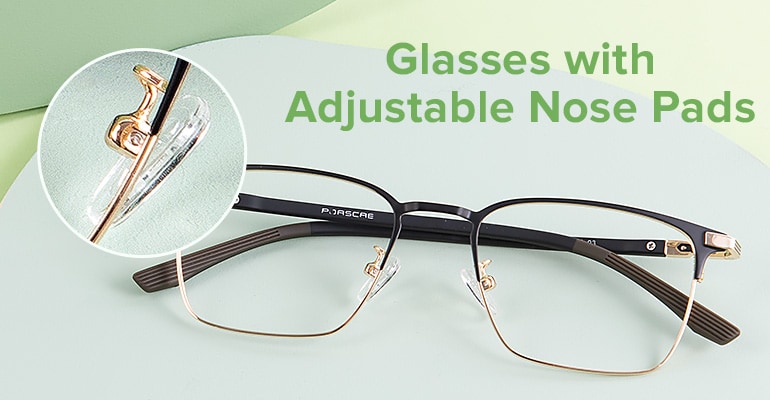How to Stop Glasses from Sliding Down Nose: 5 Effective Solutions
Mar 27 2024

When wearing glasses, one common annoyance is the tendency for the frames to slip down the nose. This not only requires frequent readjustment, but it can also be a distraction throughout the day. The slippage occurs for a variety of reasons, such as the natural oils on one's skin, an improper fit of the glasses, or the wrong frame design for the individual's face shape. People with this issue are often looking for reliable solutions to ensure their glasses stay in place comfortably.
There are practical steps that individuals can take to prevent their glasses from sliding down their nose. Adjustments to the fit of the frames, as well as various products that increase grip or friction between the glasses and the skin, can be quite effective. For instance, ensuring that the glasses fit the width of the face properly can significantly reduce movement, and employing accessories such as nose pads may offer additional stability.
Regular cleaning of the glasses and the skin where the glasses rest can also minimize slippage caused by oils.
Understanding Why Glasses Slip
Slippage of eyeglasses is a common concern for many wearers. To effectively prevent and combat this issue, one must first understand the factors at play, including the unique anatomy of their face, material of the frames, and the natural oils produced by their skin.
Factors Contributing to Slipping
Several key elements contribute to the downward migration of glasses.
-
Oily skin increases the likelihood of slippage as it reduces friction between the skin and the glasses.
-
Sweat can further exacerbate this problem, acting as a lubricant.
-
Moreover, certain activities or movements can cause the frames to bounce or shift, gradually leading them to slide down the nose.
Impact of Face Shape and Nose Bridge
A wearer's face shape and nose bridge anatomy significantly influence how well glasses stay put. For example, a shallow or narrow nose bridge may offer less support for the glasses, causing them to slip more easily. Certain face shapes may also require tailored frame designs to ensure a secure fit.
Material and Design of Frames
The choice of material for frames plays a crucial role in their tendency to slip.
- Metal frames can be more prone to slippage when they lack proper nose pads or when those nose pads are not adjusted to fit the wearer's nose bridge snugly.
- On the other hand, plastic frames, particularly those made of acetate, may provide better grip but can become slippery when affected by skin oils or sweat.
- The design of the frames, including their weight distribution and whether they have a suitable gripping mechanism, is also crucial for stability.
Proper Fit and Adjustments
A well-fitted pair of glasses should sit comfortably on the nose without sliding down. This can be achieved by focusing on the nose pads, temples, and overall alignment of the glasses.
The Role of Nose Pads in Fit
Nose pads are crucial for a secure fit as they provide the necessary friction to prevent slipping. Adjustable nose pads allow for a custom fit to the contour of the wearer's nose. A screwdriver can be used to tweak the nose pads for optimal grip. To further enhance the fit, one can opt for glasses with nose pads specifically designed for better grip.
Adjusting the Temples for Grip
The temples of glasses play a significant role in providing grip behind the ears. They should be adjusted so that they apply just enough pressure to keep the glasses in place.
Metal frames often allow the wearer to adjust the temples without the need for heating. However, for plastic frames, slight warming with a hairdryer may make them more pliable for adjustment.
Care should be taken to bend the temples where they meet the hinge to avoid breaking.
Ensuring Correct Alignment and Balance
Glasses must be properly aligned to ensure they do not slip; this includes balanced temple length and an even fit across the face. One can manually adjust the angle and position of the temple pieces to correct any imbalance. If the glasses sit too high, low, or are tilted on the face, minor tweaks can correct this, ensuring even weight distribution and preventing slippage.
Optician and Optometrist Solutions
Seeking professional help from an optician or optometrist can provide tailored solutions to prevent glasses from slipping. These experts harness specialized tools and knowledge to ensure your frames fit perfectly and comfortably.
Professional Adjustments and Repairs
An optician can perform a series of precise adjustments to the glasses' frame to increase the grip at the nose bridge. This often involves:
The use of a professional glasses repair kit is essential in these adjustments to apply the necessary pressure correctly without damaging the glasses.
Customization Options for Better Fit
Optometrists or opticians might recommend custom solutions, such as:
Customization offers precise solutions that keep glasses from slipping, factoring in individual facial features and preferences.
DIY Solutions and Tips
When glasses slip down one's nose, it can be annoying and disruptive. The following tips offer practical DIY solutions to this common problem.
Using Wax and Other Adhesives
Wax solutions, like Nerdwax, can be applied to the nose pads or the bridge area to increase friction and grip. A small amount of the product on these contact points can prevent glasses from slipping. Other adhesives, like clear silicone could also be applied sparingly to create a non-slip surface.
Homemade Nose Pads and Grips
To create a homemade grip, individuals can use silicone nose pads that stick to the frames and provide a comfortable cushion.
Additionally, small loops fashioned from hair ties or rubber bands can act as temporary nose pads to add grip without affecting the appearance significantly.
Tightening Loose Screws and Bent Temples
Glasses often slip due to loose screws or bent temples.
Tightening the tiny screws at the hinges can be done at home with a small screwdriver. If the temples are bent, they can be gently adjusted by applying moderate heat (such as with warm water or air from a hairdryer) and then manually bending them back into the correct position. However, these adjustments should be approached with caution to avoid damaging the frames.

Specialized Products
When glasses slide down one's nose, it can not only be annoying but also hinder vision. There are specialized products with adjustable nose pads designed to address this issue, ensuring that eyewear remains secure and comfortable.
Eyewear Bands and Straps
Eyewear bands and straps offer a straightforward solution to prevent glasses from slipping. They attach to the frame's arms and either wrap around the back of the head or hang around the neck when glasses are not in use. Most are adjustable for a customizable fit and typically made from materials like neoprene or silicone for comfort and stability.
Ear Hooks and Temple Tips
Ear hooks and temple tips add extra hold to the arms of the glasses, keeping them in place by contouring to the shape of the wearer's ears.
These products often utilize soft silicone for a gentle yet firm grip on the ear, reducing the likelihood of glasses sliding down the nose.
Nose Pads and Other Accessories
Nose pads are a common fix for slippage issues, with silicone nose pads being a popular choice due to their comfortable fit and non-slip properties. They increase the surface area in contact with the skin, helping to keep glasses in place. Some individuals may opt to apply a wax coating to the pads for additional grip.
Preventative Care and Everyday Habits
To maintain both comfort and optimal vision, eyeglass wearers can adopt a variety of daily practices and preventative care measures. These steps help to mitigate the issue of slipping glasses and ensure a secure fit throughout the day.
Skin Care for Reducing Slippage
Proper skin care plays a significant role in preventing eyeglasses from sliding down one's nose. An individual should incorporate oil-free facial cleansers into their daily regimen to remove excess grease that could compromise the grip of their glasses. Applying oil-absorbing products like blotting paper can also be an effective measure to reduce skin oiliness throughout the day.
Handling and Storage Best Practices
When not wearing glasses, one should always store them on a flat surface with the lenses facing upward to avoid scratches. It is also imperative to handle the eyeglasses by the frame rather than the lenses to minimize contact with oils from the hands. In addition, regular tightening of the hardware with a small screwdriver can keep the frames from becoming loose and slipping.
Adjustments for Active Lifestyle
For those leading an active lifestyle or involved in sports, certain adjustments to eyewear can make a significant difference. Adding silicone nose pads or ear grips can enhance the overall grip, reducing movement during physical activity.
If adjusting the fit of glasses at home, a hair dryer can gently warm the frames for better molding to the face, although professional adjustment by an optician is recommended for the best fit and to avoid damage to the lenses.
-
Tightening the Screws: A common fix to secure the arms of the glasses, which, if loose, can lead to slippage.
-
Adjusting the Frame Width: To reduce the downward movement, an optician can alter the frame width for a snugger fit around the head.
-
Nose Pad Replacement: Outfitting the glasses with new, high-quality nose pads that offer better friction and support.
-
Frame Material Selection: Guiding the choice of frame materials that naturally provide more hold and comfort on the nose.
-
Examples:
-
Neoprene eyewear band: secures glasses during high-motion activities.
-
Silicone eyeglass band: provides a snug, non-slip grip.
-
-
Materials:
-
Silicone ear hooks: Flexible and soft, ensuring a secure attachment to the glasses' arms.
-
Rubber temple tips: Enhance the grip behind the ears for increased stability.
-